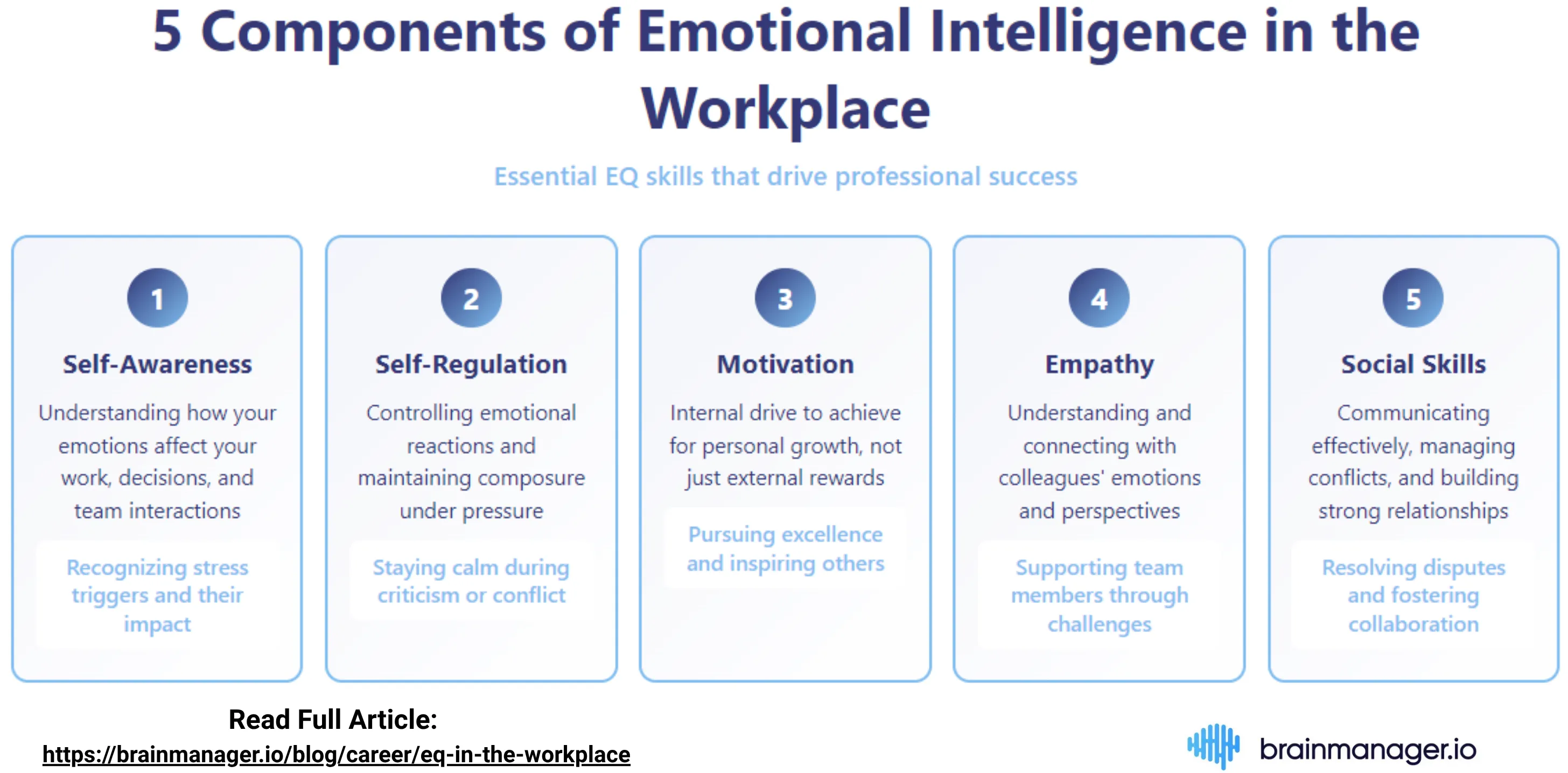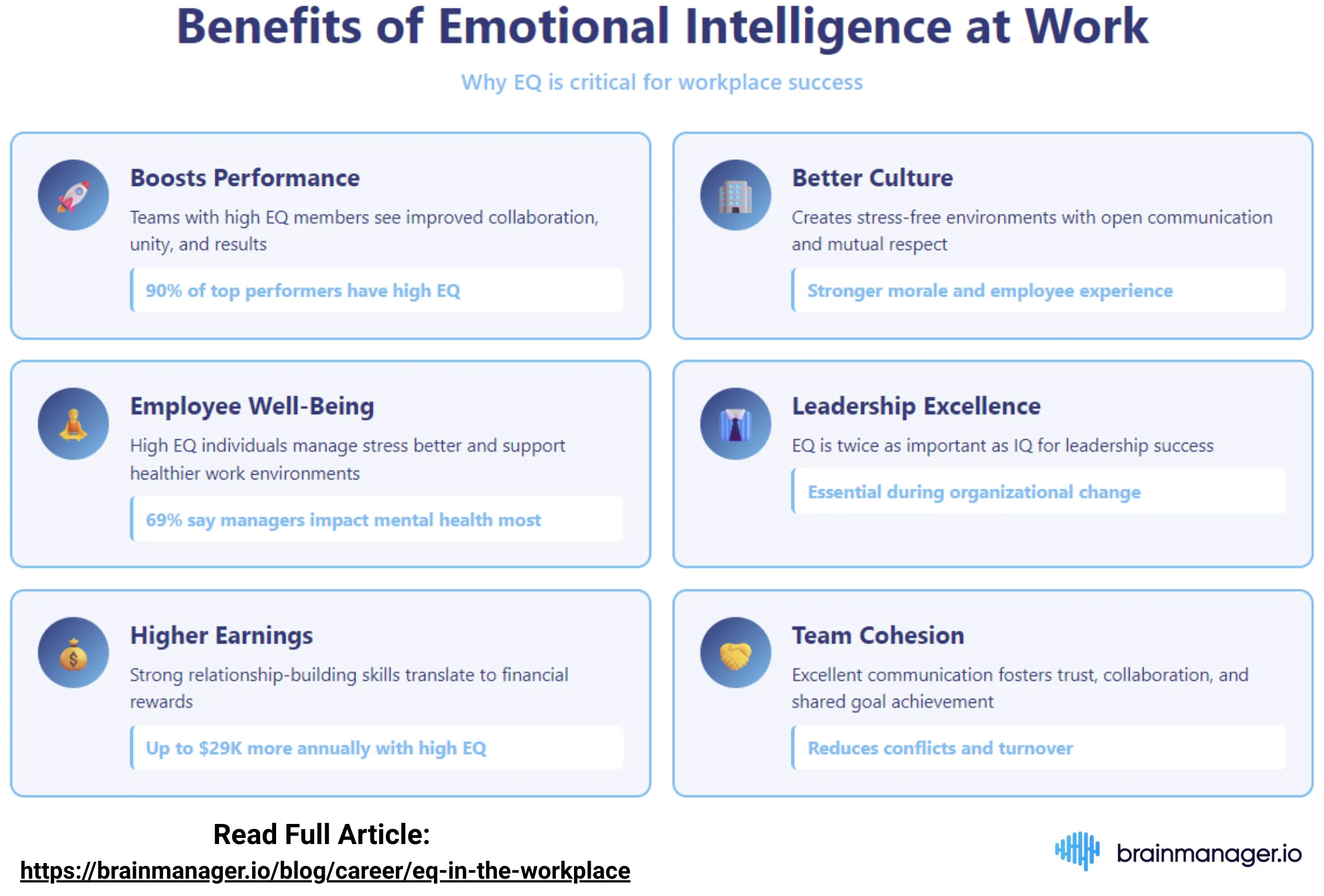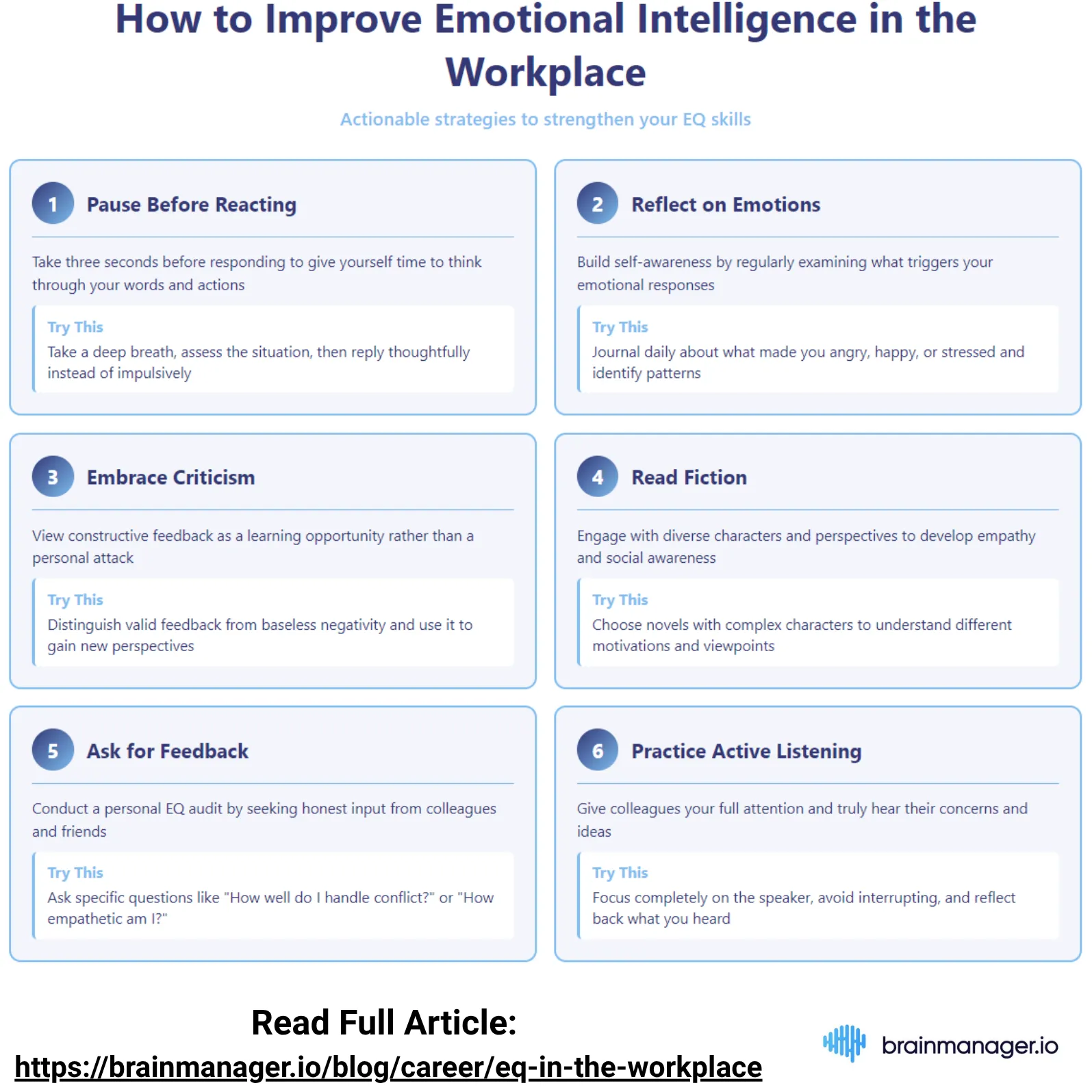Benefits of Emotional Intelligence in the Workplace: Why EQ Matters at Work (and How to Improve It)
Research shows that emotional intelligence (EQ) is even more crucial than IQ for workplace success. Employees with high EQ thrive in communication, teamwork, and conflict resolution, creating a collaborative and productive environment. This article covers what makes emotional intelligence important in the workplace and provides actionable steps to develop this vital skill.


Back
10 mins read
Technical skills might get you the job, but they don't guarantee your next promotion. To advance into leadership roles, you need to develop emotional intelligence.
Emotional intelligence is among the most vital workplace skills. It enables leaders to coach teams effectively, foster collaboration, manage workplace stress, and deliver constructive feedback.
Understanding and managing emotions—both your own and those of others—is essential for navigating the emotional highs and lows of work environments.
The workplace is a dynamic emotional landscape, ranging from stress and pressure to excitement and fulfillment. High emotional intelligence equips you to navigate these challenges effectively, fostering personal resilience, enhancing workplace well-being, and contributing to a supportive and collaborative work culture.
Emotional intelligence influences how individuals build and sustain relationships in professional settings. A workplace where employees demonstrate high emotional intelligence often experiences greater job satisfaction, improved performance, and stronger retention. Conversely, a lack of emotional intelligence can lead to higher turnover, frequent conflicts, and reduced productivity.
It’s no surprise that emotional intelligence has become a top priority for employers, with 71 percent favoring candidates who demonstrate high EQ over those with higher IQ.
In this article, we’ll focus on the importance of emotional intelligence in the workplace, examples of its impact on professional relationships, and actionable tips to improve this essential skill for career success. Keep reading!
Related: 15 Emotional Intelligence Interview Questions to Spot—or Show—EQ
What Does Emotional Intelligence Look Like in the Workplace?
Emotional intelligence (EI), sometimes referred to as EQ (for Emotional Intelligence Quotient when connected with a test score), is the ability to recognize, understand, and manage your own emotions while also effectively navigating the emotions of others.
In the workplace, EQ fosters better collaboration, reduces stress, and improves conflict resolution. Daniel Goleman, who popularized the concept, noted that emotional intelligence is more critical to workplace success than IQ and technical skills, especially at leadership levels.
In practice, high emotional intelligence helps employees adapt to change, stay calm under pressure, and maintain positive professional relationships.
EQ doesn’t diminish the importance of technical expertise or cognitive ability, but these are often seen as baseline qualifications, while emotional intelligence sets high performers apart.
The following sections explore how emotional intelligence specifically applies to workplace success and the essential components that drive it.
5 Components of Emotional Intelligence in the Workplace
Emotional intelligence in the workplace consists of key components that influence how individuals interact, lead, and thrive in professional environments. These components include self-awareness, self-management, motivation, empathy, and social skills, all of which play a critical role in workplace dynamics.

Here’s how these components play out in a career setting:
1. Self-Awareness
Self-awareness involves recognizing how your emotions influence your performance, relationships, and decision-making. In the workplace, this includes understanding your strengths and weaknesses and how they impact your team dynamics. Leaders with strong self-awareness can better anticipate their reactions, enabling them to approach challenges with clarity and thoughtfulness.
For example, a self-aware leader might realize that their anxiety about meeting tight deadlines could unintentionally create stress for their team. By addressing their emotions constructively, they can foster a more productive and supportive environment.
2. Self Regulation
Self-regulation refers to the ability to manage and control your emotions, reactions, and behaviors, especially during high-pressure situations. In the workplace, this skill ensures that your responses remain constructive and measured, even in the face of stress or conflict.
A leader with strong self-regulation might handle criticism calmly, use setbacks as learning opportunities, or navigate difficult conversations with poise. This stability not only improves decision-making but also fosters trust and respect among colleagues.
3. Motivation
Motivation in the workplace is the internal drive to achieve goals for personal satisfaction rather than external rewards. Employees with high motivation are proactive and enthusiastic, fostering a positive organizational culture through their optimism and commitment to excellence.
Emotional intelligence plays a crucial role in fostering intrinsic motivation. It encourages individuals to set higher standards and maintain resilience in the face of challenges. This drive pushes them to continuously improve and contribute positively to their teams.
Leaders who demonstrate internal motivation inspire by example. Their determination and optimism create a workplace culture that values growth and achievement, encouraging teams to maintain high performance and pursue shared goals with passion and purpose.
4. Empathy
Empathy is the ability to understand and connect with the emotions of others. In professional settings, empathy enables leaders to listen actively, resolve conflicts, and show genuine concern for their team members’ well-being.
An empathetic leader might recognize when an employee is struggling with work-life balance and offer flexible solutions to support them. By doing so, they build stronger bonds and foster a collaborative workplace environment.
5. Social Skills
Social skills are essential for effective communication, collaboration, and relationship management in the workplace. These include conflict management, teamwork, and the ability to inspire and guide others.
Employees with strong social skills excel at conflict management, resolving disagreements constructively, and ensuring team harmony. Leaders who prioritize open communication and relationship-building create a culture of trust, where employees feel valued and supported.
Social intelligence, a key aspect of emotional intelligence, takes social skills to the next level by enabling individuals to navigate complex interpersonal dynamics with empathy and insight.
While emotional intelligence helps individuals understand and manage emotions, social intelligence focuses on applying this awareness in interactions with others. Socially intelligent employees can read nonverbal cues, adapt to different communication styles, and foster inclusive interactions, strengthening workplace relationships and creating a more cohesive team environment.
By focusing on these components, individuals can develop emotional intelligence tailored to workplace success. High emotional intelligence enhances personal and professional growth and contributes to a thriving and resilient organizational culture.
The Benefits of Emotional Intelligence at Work
Emotional intelligence is essential in every aspect of business operations.
Take communication, for instance: a workplace with low emotional intelligence among employees will quickly experience breakdowns in communication. People won't trust each other enough to communicate freely and will, therefore, retreat into silos, only talking when necessary.
Conversely, employees with higher emotional intelligence have excellent communication skills. They constantly exchange ideas and are less likely to experience misunderstandings or tolerate inappropriate remarks from colleagues.
As we are about to see, the benefits of emotional intelligence in the workplace extend beyond communication.
EQ Boosts Productivity and Performance
Emotional intelligence benefits individuals and teams. Having this skill as a leader helps foster unity, which, in turn, boosts productivity. A team with just a few high EI members can experience a significant improvement in results.
High productivity means better performance. TalentSmartEQ ranks emotional intelligence as the number one predictor of workplace performance, with 90% of top performers having high EQ.
In addition to fostering leadership skills, EI helps employees collaborate more effectively and manage relationships with colleagues. High EQ employees are also better at navigating conflict productively, supporting team growth and innovation.
EQ Fosters a Better Workplace Culture
A workplace with emotionally intelligent employees is a stress-free environment that boosts morale and creates a better employee experience. Teams that communicate openly and respect one another contribute to a stronger workplace culture.
Additionally, emotionally intelligent teams are better equipped to resolve conflicts and achieve their goals collaboratively, strengthening the foundation for long-term success.
EQ Supports Employee Well-being
Employees with high EQ are naturally better at managing emotional stress. A study found that self-management and self-awareness are excellent predictors of adequate workplace stress management.
For leaders, high emotional intelligence enhances employee well-being by fostering good relationship management. It’s no wonder that 69% of workers report their managers have the greatest influence on their mental health—on par with their partners.
Highly empathetic managers can effectively understand and address employee needs, positively influence performance, and build healthy manager-employee relationships through clear and thoughtful communication.
High EQ Makes the Best Leaders
As Daniel Goleman's research revealed, emotional intelligence is twice as important as IQ in workplace leadership.
An emotionally intelligent leader can identify strengths and weaknesses in themselves and their team, a vital skill in talent management. Their active listening abilities enable them to respect diverse perspectives and make informed decisions.
Emotional intelligence is especially valuable during periods of organizational change, where leaders must collaborate, influence, and maintain momentum. Strong relationship management skills make them better equipped to navigate these challenges successfully.
People with High EQ Earn More
Research by TalentSmartEQ shows that the secret to higher earnings lies in the quality of relationships. People with high emotional intelligence earn up to $29,000 more annually than those with low EQ.
Additionally, individuals with high EQ are more likely to experience job satisfaction and are less likely to suffer from burnout, making emotional intelligence a financial and emotional asset.
EQ Builds Workplace Cohesion
Employees with high emotional intelligence excel at communication. They openly share their ideas and are equally receptive to others' perspectives.
This openness fosters a collaborative environment where trust and respect flourish, enabling teams to work together harmoniously and achieve shared goals.
Examples of High and Low EQ at Work
We now know that high emotional intelligence is advantageous in the workplace, but how can we tell who has it and who doesn’t?
Here are examples of both high and low-EQ individuals to help you spot the differences.
Team Feedback Session
During a team feedback session, Sarah, who demonstrates high emotional intelligence, listens attentively to her colleagues’ critiques on her recent project. She nods, takes notes, and thanks each person for their input. Instead of feeling defensive, she asks clarifying questions to better understand specific areas for improvement. After the session, Sarah reflects on the feedback and proactively applies changes to her work.
In contrast, James, who has low EQ, feels defensive and dismisses his colleagues’ feedback as irrelevant or unfair. He frequently interrupts others to justify his decisions and leaves the meeting frustrated. Rather than making adjustments, James avoids further discussion, which ultimately stifles team growth and collaboration.
Conflict Resolution
When a disagreement arises between Anna and a coworker over project priorities, Anna, an emotionally intelligent worker, remains calm and suggests a one-on-one meeting to address the issue. She listens carefully to her coworker’s concerns and acknowledges their perspective. Together, they find a solution that respects both their priorities and advances the project.
On the other hand, Alex, who has low EQ, reacts emotionally, raising his voice and insisting on his own priorities. He dismisses his coworker’s views entirely, creating tension and disrupting the team dynamic. The unresolved conflict slows progress and fosters resentment among team members.
Handling Stressful Deadlines
When faced with a tight project deadline, Maria, who exhibits high emotional intelligence, calmly assesses the situation and organizes her tasks based on priority. She communicates openly with her team, ensuring everyone understands their roles and offering support where needed. By staying composed, Maria keeps the team motivated and focused, leading to the successful completion of the project.
In contrast, Peter, who has low EQ, panics under the pressure of the deadline. He snaps at colleagues, blames others for delays, and fails to delegate tasks effectively. His inability to manage his emotions creates a stressful environment, lowering team morale and resulting in missed deadlines and subpar outcomes.
Client Interactions
When dealing with a dissatisfied client, Emily, who has high emotional intelligence, listens attentively to the client’s concerns without interrupting. She acknowledges their frustration, validates their experience, and calmly explains potential solutions. By remaining composed and empathetic, Emily not only resolves the issue but also strengthens the client’s trust in the company.
In contrast, Tom, who has low EQ, reacts defensively to the client’s complaints, dismissing their concerns as overreactions. His lack of patience and unwillingness to understand the client’s perspective escalate the situation, leaving the client feeling unheard and dissatisfied. This damages the company’s reputation and risks losing future business.
Leadership and Management
In her role as a manager, Karen, who demonstrates high emotional intelligence, regularly checks in with her team to understand their workload and morale. She provides constructive feedback with kindness, recognizes individual contributions, and ensures everyone feels supported. When her team encounters challenges, Karen remains calm, guides them through solutions, and fosters a positive, resilient work environment.
On the other hand, Mike, who has low EQ, ignores his team’s concerns and often micromanages their work. He provides criticism in a harsh tone, focusing on mistakes rather than solutions. His inability to manage stress trickles down to the team, creating a tense atmosphere that lowers morale and productivity.
How to Enhance Emotional Intelligence in the Workplace
We’ve seen how low emotional intelligence negatively impacts both individuals and organizations. However, all is not lost for those with a lower emotional quotient. Emotional intelligence can be learned and strengthened over time.
Here are actions to improve emotional intelligence, focusing on self-awareness, social skills, self-management, and empathy.
Pause Before Acting
The "three-second rule" isn’t just for dropped food. Pausing before reacting helps you consider your words and actions, preventing reckless talk and impulsive decisions.
For example, before responding to criticism or a challenging comment, take a deep breath, assess the situation, and then reply thoughtfully. With practice, mindful pauses can significantly enhance EQ over time.
Reflect on Your Own Emotions
Self-awareness, one of the core components of EI, can be cultivated through regular reflection. Take time to understand your emotions—what triggers them, how you respond to various situations, and what truly makes you angry, happy, or stressed.
This reflection not only improves self-awareness but also fosters empathy, helping you better understand others' perspectives and emotional states.
Learn from Criticism
Criticism is often hard to accept, especially when it challenges your work or ideas. However, viewing constructive criticism as a learning opportunity can transform it into a positive experience.
That doesn’t mean all criticism is valid—it’s essential to distinguish constructive feedback from baseless negativity. Develop a high level of tolerance for constructive criticism, using it to gain alternative perspectives and improve your skills.
Read Fiction
Studies show that reading fictional literature develops empathy by helping us understand different characters' thoughts, motivations, and actions. Engaging with stories about diverse perspectives enhances your social awareness, a critical component of emotional intelligence.
Ask for Feedback
Conduct a personal EQ audit by asking colleagues, managers, friends, or family for honest feedback. Questions like “How empathetic am I?” or “How well do I handle conflict?” can provide valuable insights.
Although hearing criticism can be uncomfortable, it’s an essential step to identifying areas for growth and improving your emotional intelligence.
High Emotional Intelligence is Key to Work Success
Business thrives when people work together coherently, fostering strong collaborations and meaningful relationships. Without these elements, organizations face challenges like disengaged employees, persistent conflicts, and reduced productivity.
Emotional intelligence matters in the workplace because it forms the foundation for resolving conflicts, building strong relationships, and creating a supportive environment where teams can collaborate harmoniously. These skills drive innovation, improve morale, and enhance overall success.
According to Daniel Goleman, self-management, self-awareness, social skills, and empathy are the abilities that separate the most successful leaders and employees from the average. In higher-level roles, where technical expertise is expected, it’s how individuals manage themselves and others that gives them an edge.
Some careers and jobs are best suited for individuals with high EQ, as they require a deep understanding of others’ emotions, strong communication, and the ability to navigate complex interpersonal dynamics.
The good news?
Anyone can develop and refine emotional intelligence skills. By actively working on self-awareness, practicing empathy, and seeking constructive feedback, you can strengthen your EQ and unlock new opportunities for growth.
Start small: focus on one area of emotional intelligence this week.
Whether it’s pausing before reacting, listening more attentively in meetings, or reflecting on your emotions at the end of the day, each step will bring you closer to becoming the leader or teammate you aspire to be.
Your journey to enhanced emotional intelligence begins with a commitment to self-reflection and personal growth. Take action today to build stronger relationships, navigate challenges effectively, and achieve greater success in your career and workplace.


Return to Blog











